Photographs: B Mathur/Reuters
Claude Arpi reports on the engaging interaction:
Part I: Exclusive: An interview with The Dalai Lama
Would you say that Chinese society is not a healthy society today?
When authoritarian systems are institutionalised like in China or (North) Korea, (there is a problem). In cases like Libya or Iran, it is less institutionalised, it depends more on individuals; the same thing for Saddam Hussein, he was one single person or in Burma, it is only a few generals who have become dictators. Once this generation is gone, the new generation, will be different.
But in Communist countries, it is institutionalised; the new leadership always continues (in the footsteps of the previous one). It is wrong.
I always tell my Chinese friends (some of them come from mainland China) that the Communist theory is very good. I myself believe in Marxism; it is good.
But when Lenin established a new State and carried out the Bolshevik Revolution with the masses, the idea was pure, very humanistic; thinking about the working class people's rights and equal distribution of wealth (was good).
But it changed when Lenin brought politics (into the Revolution) particularly at a time when there was a serious civil war within Russia and with outside forces intervening in the civil war.
Under Lenin, Marxism became mixed with 'power'. Under such circumstances, it created distrust, suspicion. One can understand for the civil war (in Soviet Union), but it later became part of Marxism, (even) during peace time. This is unfortunate.
The Communist Party is very powerful in China, why is it so afraid to tell the truth?
That is why we need promotion of moral ethics. It is the third way, without touching religion; just using our common experience, our common sense. To this you should add the latest scientific findings; (scientists also say) a peaceful mind is better (for a good health).
Using all this, we can educate people about moral ethics for their day to day life. Everybody wants a happy life, happy days and nights.
'Promotion of harmony under the gun is not possible'
Image: Chinese residents read a book about Hu Yaobang, former Communist Party chief, at a bookstore in YichPhotographs: China Newsphoto/Reuters
This article of Wen Jiabao indicates that there is a strong group (in the Party) who sees that the present condition is not right. This article praising Hu Yaobang indicates that Wen is not happy (about the current situation).
Hu Yaobang was an extraordinary Communist leader. There is no question about it. (The publication of the article) is positive.
Another news: There was a letter from (former president) Jiang Zemin to Hu Jintao (the current president) in which there was some criticism about Hu Jintao. It has been made public by (vice-president) Xi Jinping. It also gives some small indication.
I usually divide the last sixty years into four eras: Mao's era, Deng Xiaoping's, Jiang Zemin's and now Hu Jintao's. There have been great changes. Regarding Hu Jintao's era, I very much agree about his promotion of a Harmonious Society, it is very correct.
But in order to develop this, freedom of speech and expression, transparency is also very important. Hu Jintao does not dare to implement this. Promotion of harmony under the gun is not possible. Hu Jintao is doing this.
That is not harmony. I think that a large number of people are full of resentment, but they keep quiet. It is hypocrisy to call this harmony. Countries like the US, Europe, Australia, India are generally (considered as) free countries. (In these countries) it is relatively much easier to find close friends that you can trust, with whom you can share your feelings.
In Communist countries, it is comparatively more difficult. Everywhere, politics, politics, politics, spies are everywhere. In the Tibetan case, it is even worse.
On several occasions, when Tibetans come from Tibet and meet me in this room, I talked with them. When I ask some sensitive questions, they always look around (before answering). Even in my room!
They are so suspicious, scared, they fear. It is part of their lives.
On several occasions, I met some young Chinese who told me, nowadays everywhere they have to carry two faces, one real and one artificial.
I have also the experience during the nine years of living with the Chinese Communists (between 1950 and 1959). I have learned how to do this (making faces and laughing).
Last year, I met Zhang Boshu, a famous Chinese scholar; he came to see me in Washington. But after he returned, he was dismissed from his job. One can understand, if any one meets the Demon, it is punishable (laughing).
Look at India, despite many drawbacks, democracy is deeply rooted in this country. Compared to Pakistan, Sri Lanka, Bangladesh, India is much, much more stable.
Although there are different variations, Tamil people use the Tamil language, you have Malayalam, Telugu, Kannada, Oriya languages and in the North, you have Hindi, Punjabi, Kashmiri, etc and the North-East, Assamese, etc. You have even different scripts!
This works under a democratic Constitution and an independent judiciary. This is very important.
'Tibetan culture is a culture of peace'
Image: Tibetan monks from India make a mandala during the Gong festival near BarcelonaPhotographs: Gustau Nacarino/Reuters
I wanted to mention something (else) about Tibetan culture: I spoke about Tibetan ecology, then Tibetan philosophy, now about Tibetan culture.
I make a distinction between Buddhism and Tibetan culture, though Tibetan culture is very much related to Buddhism.
I described Tibetan culture as a culture of peace and compassion. This is probably due to the large area (of the Tibetan plateau), the small population and the difficult life. This creates some kind of harmony with nature.
Due to the natural environment, your own livelihood depends more on others. This creates a sort of closer society, a cohesiveness, a kinship.
'A sort of cultural genocide is taking place'
Image: A Tibetan monk prays at a monastery in SiliguriPhotographs: Rupak De Chowdhuri/Reuters
I said, 'some kind of cultural genocide'; it is because in the eyes of hardliners, their only concern is how to handle Tibet, how to keep Tibet as a part of China.
(I said this) more than ten years ago, when Chen Kuiyuan was party secretary in Tibet (1992 to 2000). At a party meeting, Chen mentioned that the ultimate threat to China is the Buddhist faith of the Tibetans.
(Recently), I was in Switzerland, I met some Tibetans. They know well the Tibetan university in Lhasa; they told me that the level of Tibetan studies before Chen Kuiyuan was quite good.
After Chen became party secretary, it changed. Tibetan texts were banned. Only the Chinese curriculum was allowed and translated into Tibetan; the courses were (conducted) according to this curriculum.
Chen Kuiyuan saw the unique Tibetan culture heritage as a threat to separate Tibet from China. So he systematically eliminated Tibetan (culture) from Tibet.
Last year, I met a Tibetan who has settled in Australia and visits Tibet from time to time and brings money to build schools in his native place. Last year, after his return (to Tibet), he told me that one of his friends working in the education field told him the present party secretary (Zhang Qingli) convened a meeting of Han officials only.
The central government had asked Zhang to make some suggestions. In order to make these suggestions, he convened this meeting with Han officials only. For education, they made the (following) suggestions to the central government: Chinese language should be the first language; it should be taught from kindergarten.
Then, all schools should emphasise about learning the importance of China and all monasteries should become like in the mainland, just museums with very few monks as caretakers.
Zhang Qingli made these three suggestions.
This meeting was held in 2009 (after the Chinese had faced so many problems from these monasteries in March 2008). The meeting suggested a new education policy with these three points. (I don't know) if it is true or not, I have no way to cross-check.
As mentioned earlier, officially, there is a lot of restrictions about Tibetan studies. When Chen Kuiyuan was there, whatever had a religious meaning was removed (from the curriculum). Then when Jiang Zemin came, new restrictions (were put in place).
Before party officials could have (in their house) an altar with some Buddha statues; they usually had an excuse like "My old mother likes these statues"; although they are supposed to be genuine Communists, non-believers.
When Jiang Zemin became chairman, it was not possible anymore. In the meantime, some very high Chinese party officials, including from the PLA, had my picture on their mobiles, the Demon's picture! (Laughing.)
(Another) thing, because of the overwhelming Han population (in Tibet), we noticed that the behaviour of the young Tibetans who come from Tibet and the Tibetans who are born here is very different.
Here Tibetans are gentler and the Tibetan spirit is more alive than for those who come from Tibet; the (latter) are very short temperered. They are always ready to fight.
Whether it is intentional or unintentional, a sort of cultural genocide is taking place.
(I also noticed that) Chinese living outside (China) who are part of some democratic movements for China do not work harmoniously (between themselves). There is a lack of cooperation, some live in America, some in Australia, in Singapore or France, (but) they are not working together.
'In a Communist regime, if someone brings a different idea, he is almost considered an enemy'
Image: A Tibetan man walks past soldiers in the main square in Kangding city, ChinaPhotographs: David Gray/Reuters
That's right.
Because of the Communist regime in China, if someone brings a different idea, he is almost considered an enemy. They have no experience to listen to different views; different ways to agree.
Often with people who have grown up in a Communist society, if someone with a different opinion comes, they remain distant, they do not cooperate.
So, I tell the Chinese from mainland China in a friendly manner 'you should forget this habit. There is no harm if when you are ten different people, you have ten different views; hundred people, hundred different views. It is natural. You must learn to listen to others' view and work together.'
I think that (this habit from the Cultural Revolution) is also some kind of 'cultural genocide'; the Chinese culture is gentler, more humble.
'Chinese are much more hard-working than my Indian friends'
Image: Workers in Longhua, southern Guangdong, ChinaPhotographs: Bobby Yip /Reuters
Yes, I know, the Chinese people are wonderful people. This, I always felt. And as far as work is concerned, the Chinese are much more hard-working than my Indian friends (laughing). I think it is perhaps due to the climate.
The German, Swedish, Dutch people are working hard while the Italians, Greeks working less, (they are) a bit lazy! (Laughing.)
Are there any differences between the Chinese from the South and North?
But I consider Indians my gurus because we follow the Nalanda tradition.
All our concepts and way of thinking comes from the Nalanda Masters. Therefore, we are the chelas (disciples) and Indians are our gurus.
I also often say that we are reliable chelas because after the 8th century, the Nalanda tradition was established in Tibet, after that in our guruji's own home, lots of ups and downs happened.
Over a thousand years, we have kept intact the Nalanda tradition. That means that we are reliable chelas.
I describe myself as a Son of India, firstly because my thoughts come from the Nalanda Buddhist tradition and this body has lived on Indian dal, rice and chapattis during the last 51 years.
So, physically also, I am a Son of India. Sometimes, it irritates the Chinese officials. What to do?


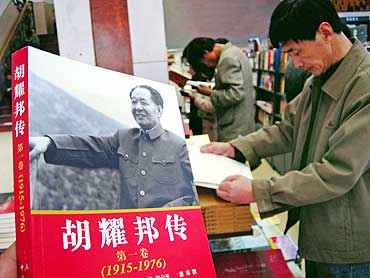
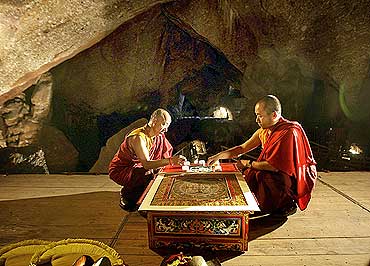
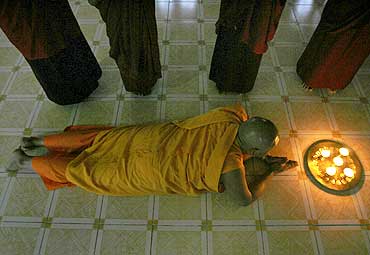
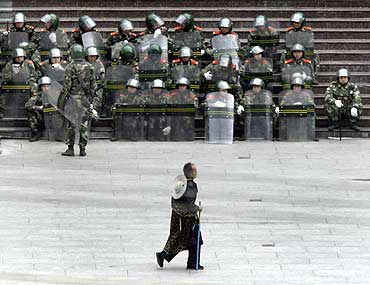
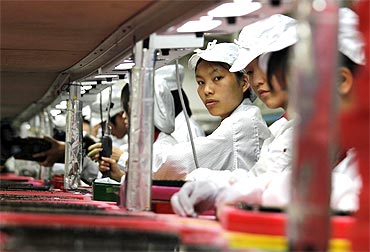
article